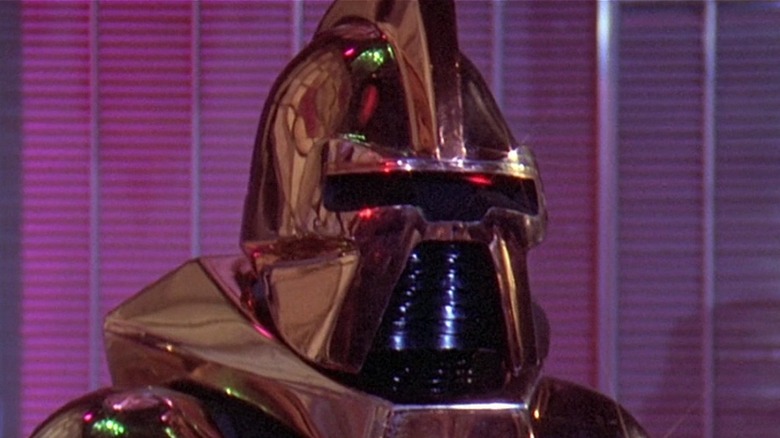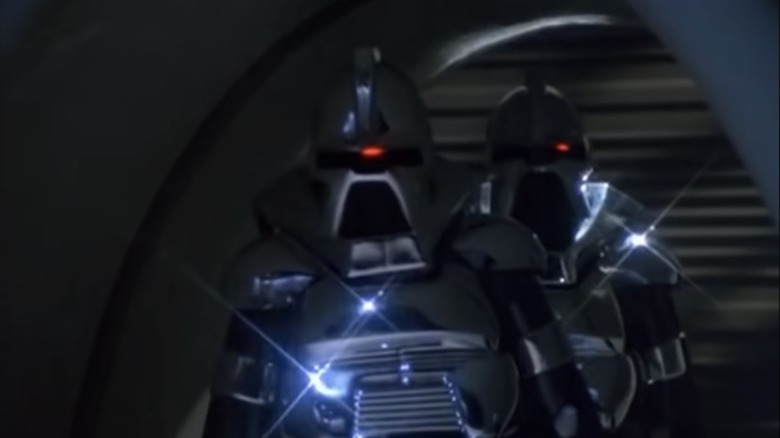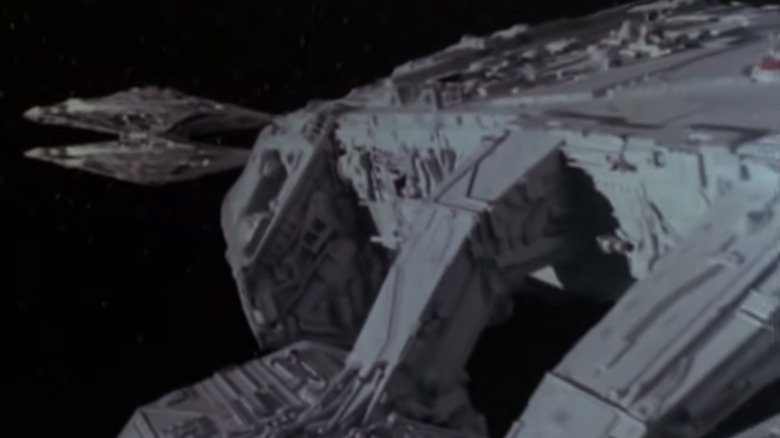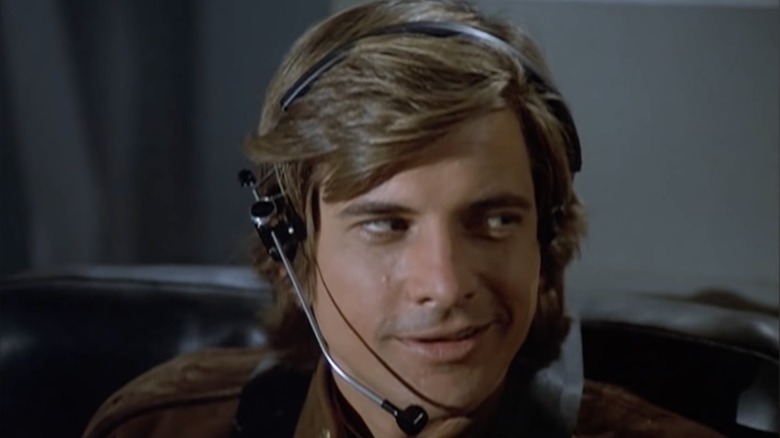Why The 1978 Battlestar Galactica Series Flopped
In 1978, the sci-fi TV series "Battlestar Galactica" first hit television screens. It seemed like a promising project, riding the wake of "Star Wars"' popularity with the talent of producer Glen A. Larson behind it, plus the star power of Lorne Greene ("Bonanza") and guest stars like Patrick Macnee, Fred Astaire, Lloyd Bridges, Jane Seymour, and Rick Springfield. The talent of writer Donald P. Bellisario, combined with special effects by John Dykstra (initially, anyway) also added to the show's appeal.
Many fans loved the epic narrative, which focused on a civilization of humans living on 12 colonies who think they are at the end of a long war with the Cylon Empire — only to find out the armistice is a ploy to hide a genocidal Cylon attack, luring the protective military battlestars away from the planets to leave the colonies undefended. In the wake of the attack, Commander Adama (Greene), of the last starship standing, forms a "ragtag army" of humanity's remaining forces and heads out in search of a 13th colony known as Earth.
The narrative clearly resonated with fans, turning "Battlestar Galactica" into a cult hit. Throughout the short-lived series, the warriors of the Galactica, led by Apollo (Richard Hatch) and Starbuck (Dirk Benedict), experienced more Cylon attacks and encountered other worlds along their path to find the lost colony. Yet the show only lasted one season before it was cancelled, and it's considered one of the biggest flops in TV history by many critics, even though it went on to inspire a more successful reboot in the 2000s. What went wrong with the original series?
The ratings declined quickly and the show was expensive to make
In 1979, The Washington Post asked Donald P. Bellisario why such a promising show ended up on the chopping block. '"There are thousands of reasons," the writer said. In the end, though, one of the main reasons boiled down to something that has ended many shows over the decades: ratings.
"Battlestar Galactica" started out with good hype that led to initial declarations by mainstream media sources (via Television Obscurities) that the show was a hit. The premiere, which aired on September 17, 1978, was the fifth highest-program of its week. However, the sci-fi show quickly lost ground to competition on CBS, which included "All in the Family" and "Alice," and NBC, which aired shows like "The Wonderful World of Disney" in the time slot against "Battlestar Galactica." The ratings slid downward rapidly, from a 40 share (or 40 percent of the TV-viewing audience) to under 30 in less than two months.
While the series still didn't do badly overall, it was expensive. Sources quoted in the book "By Your Command Volume 1: The Unofficial and Unauthorized Guide to Battlestar Galactica" claim that three-hour pilot cost between $7 and $14 million to produce. And each episode cost $1 million, which was more than twice the average for an hour-long series. With ratings not meeting expectations, and with ABC also fielding hits like "Happy Days," "Three's Company" and "Mork and Mindy," the network maybe figured it didn't need a massive, cash-consuming sci-fi project.
"I can't argue with numbers," Bellisario told the Post. "We have dropped down. There's no one thing to blame. Sunday night is the hottest viewing night of the week and the other networks hit us with everything they could."
It was plagued with accusations of copying 'Star Wars'
Although creator Larson has claimed that the concept for "Battlestar Galactica" came from a pitch to Universal Studios in 1967, by this time he was well-known for ripping off plots from movies — so much so that writer Harlan Ellison called him "Glen Larceny," according to an Esquire tribute. And many saw major parallels between his story about humans fighting an authoritative regime and the plot of "Star Wars," which came out in 1977 — 34, to be exact. At least, that was the number of similarities cited in the court case 20th Century Fox brought against "Battlestar Galactica" players Universal Studios, MCA, and ABC.
20th Century Fox wasn't the only company that thought the original "Battlestar Galactica" might be a bit too similar to the saga of the Skywalker clan. Time Magazine and other publications called the show derivative and formulaic (via Gizmodo), which couldn't have been good for it given the very competitive TV environment at the time.
While it's unclear if this lawsuit had any true effect on the prospects of the 1978 series, according to Plagiarism Today, it certainly didn't help: the lawsuit brought up the cost of the show while giving it negative buzz. Combined with other challenges the show was facing, this could have been a factor in its demise, although the suit wasn't settled until after the show was cancelled, as The Hollywood Reporter notes.
Other issues, including conflicts between the producers and ABC, may have been factors
Various sources point to a number of other factors that could have accounted for the show's downfall. For example, some accounts of the show say that filming was quite chaotic, with scripts not arriving until close to filming times and shooting on weekends just to make deadlines — and delays cost money. "By Your Command" notes that one sticking point between producers and ABC took place around the casting of character Starbuck, as the network would have preferred a different actor than Benedict, and that this conflict certainly spilled over into a production issue.
On top of problems like that, sci-fi in general was a harder sell in those days, as producer of the revamped "Battlestar Galactica" Ron Moore pointed out in a 2014 interview with Fast Company. The original "Battlestar Galactica" aired early in the evening during a family-friendly slot, leading to some censoring of elements that its creative team didn't like. Bellisario complained that the evil Cylons became, in his words, "rather laughable" when the show couldn't depict its killing machines as actual menaces. "We just couldn't take them seriously. We just couldn't make them believable as adversaries," he told the Washington Post.
In the end, even though "Battlestar Galactica" didn't prove successful in its time, it certainly launched what grew to become a landmark sci-fi franchise, and for that, the original series deserves to be remembered.



